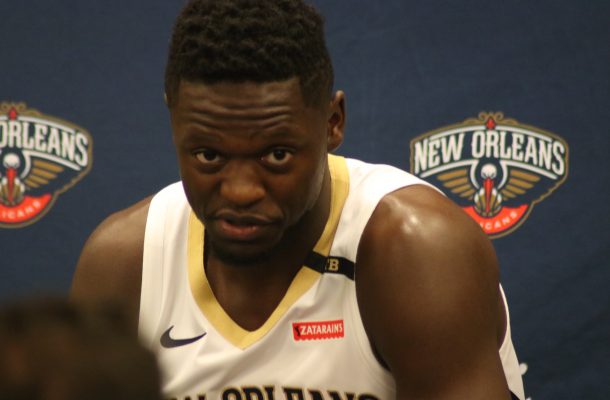« In The NO Episode 7: Perfect Pelicans No More
Pelicans Maintain Flight Path Despite Rotation Disarray

Photo Credit: Andrew Smith
Through 13 games, the Pelicans sit at 7-6 and in a 3-way tie for 9th place in the Western Conference. They are also 10th in the NBA in Net Rating per Cleaning the Glass’ stats database (which removes “garbage time”) at +3.1 points per 100 possessions (6th in the West), and have played the 6th most difficult schedule in the NBA to date according to Basketball-Reference. So, overall, while New Orleans sits just outside of the playoff picture in the West through about 15% of the season, there a lot of reasons to be optimistic about the team’s current position.
Furthermore, there’s the issue of injuries. Losing Anthony Davis for 3 full games (and getting a limited AD for two or three others) obviously hurts, as does the fact that Elfrid Payton hasn’t played in any of the Pelicans’ last 8 games (with 6 of those games on the road against teams with a ridiculous combined record of 57-22). Even Darius Miller’s four games missed a (smaller) impact. Without a doubt, the two biggest reasons for the Pelicans’ 6-game losing streak are injuries to these two players and the quality of opponents played. But that first point – injuries – has a trickle-down effect to the rest of the team, and that makes it a bit difficult to truly evaluate the depth of this Pelicans squad.
A good place to start in order to properly illustrate that point is Julius Randle. Even with Payton’s hot start before his ankle injury and Moore’s great play thus far, one could make a pretty convincing case that Randle has been one of the Pelicans’ four best players to date. However, New Orleans has been 10.3 points per 100 possessions better when Randle sits vs. when he plays, a pretty big difference. In the 725 possessions for which Randle has been on the floor without Anthony Davis this season (about half of his total time on the floor), the Pelicans have been outscored by 11.8 points per 100 possessions. Tough to reconcile, right? Sure, not having AD would hurt any lineup, but logic would indicate that a decent chunk of those minutes should be coming against the opposing team’s backups, so why has NOLA been outscored so drastically with Randle playing?
The answer is twofold: first, the more obvious one, is AD’s (and even Payton’s) injury. Suddenly, Randle is playing more minutes against opposing starters (against the likes of Utah, Denver, and Portland), and those Pelicans lineups naturally will not fare as well without the team’s MVP candidate. The second reason, while partially driven by the first, is what often gets lost. Out of those 725 possessions with Randle and without AD in the lineup, the most common 5-man unit of the bunch amassed a grand total of only 32 (!) possessions – less than 5% of that total. Now compare that to a team like Denver – their third most frequently used lineup this season (behind only the pre- & post- Barton injury starting lineups) is Morris-Murray-Beasley-Lyles-Plumlee. That group has a net rating of +5.5, & is one that Mike Malone already knows he can count on every night against opposing second units.
Simply put, the Pelicans’ rotations have been all over the place this season. Injuries have forced the team into 7 different starting lineups through 13 games this season, which impacts the bench units as well. The players with whom Randle has shared the floor has varied significantly from game to game, which makes it more difficult for those groups to consistently perform at a high level. Look no further than the Pelicans’ season to date – each of their 8 most frequently used lineups have a positive net rating. Obviously, there’s a causation vs. correlation issue there (as well as sample size), but that includes lineups like Clark-Miller-Hill-Niko-Randle & Frazier-Clark-Miller-Randle-Diallo. The point is that as groups of players (not even necessarily full 5-man lineups) play together more, the chemistry improves, as do their success.
Now, not all of this “disarray” is caused by injuries; part of it is certainly intentional. Coach Gentry is testing different players in different situations – particularly the younger players like Frank Jackson and Cheick Diallo. Jackson received some decent bench minutes early and struggled (as should be expected for a rookie), and then Gentry pivoted to more minutes for players like Ian Clark (and also Tim Frazier once the Pels added him). The coaching staff made similar moves with players like Wesley Johnson over Solomon Hill and Diallo over Jahlil Okafor. The tinkering has already paid dividends, as Clark has been more consistent than Jackson, while Johnson and Diallo have both been pleasant surprises in their opportunities so far.
Ultimately, Gentry will figure out a rotation that makes sense, which will naturally be aided by improved team health. Will it vary somewhat from night to night? Sure, as every opponent poses different challenges. But with every passing game, the coaching staff learns more about the roster and how to maximize its pieces. With that in mind, it shouldn’t be long before some consistency sets in and the Pelicans truly take flight.





One Comment